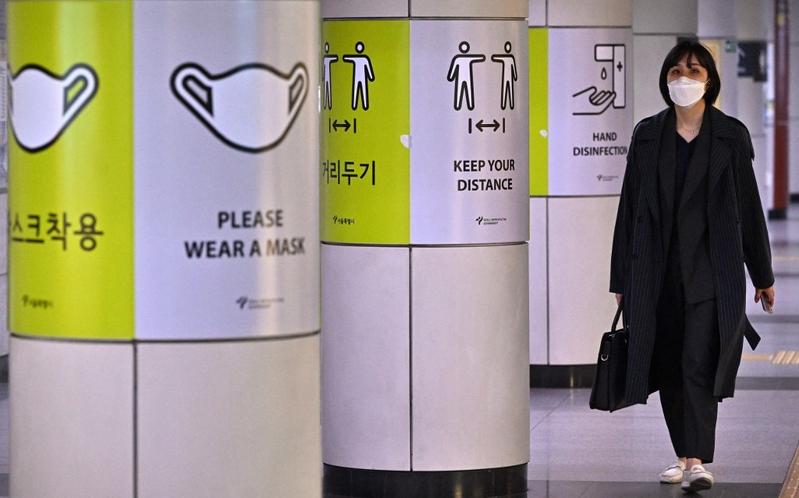 A woman walks past posters showing precautions against the COVID-19 at a subway station in Seoul on April 15, 2022.
(JUNG YEON-JE / AFP)
A woman walks past posters showing precautions against the COVID-19 at a subway station in Seoul on April 15, 2022.
(JUNG YEON-JE / AFP)
SEOUL / YANGON - South Korea said on Friday it will drop most COVID-19 pandemic-related restrictions next week, including a midnight curfew on eateries, as the Omicron surge in cases shows signs of waning, although people will still have to wear masks.
Wearing masks is still a very important means to protect ourselves. It is inevitable to maintain the indoor mask mandate for a considerable period of time.
Kim Boo-kyum, South Korean PM
From April 18, the midnight curfew on restaurants and other businesses will be scrapped, along with the cap on private gatherings which was set at 10, Prime Minister Kim Boo-kyum told a coronavirus response meeting.
"Wearing masks is still a very important means to protect ourselves," Kim said. "It is inevitable to maintain the indoor mask mandate for a considerable period of time."
On wearing masks outdoors, Kim said the government will review whether to lift the existing restriction in two weeks, depending on the virus situation.
ALSO READ: South Korea at 'critical juncture' in fight against COVID-19
The number of coronavirus cases in the country appears to have passed its peak after hovering over 620,000 a day in mid-March, with the daily infections falling to below 150,000 on Thursday.
On Wednesday, the government announced its plan to expand the rollout of the second COVID-19 booster shot for people over 60.
Israel
A fourth dose of the COVID-19 vaccine from Pfizer and BioNTech provided significant added protection against severe disease, hospitalization and death for at least a month in older individuals, according to a study from Israel conducted when the Omicron variant was dominant.
The estimated effectiveness of the fourth dose during days 7 to 30 after it was administered compared with a third dose given at least fourth months earlier was 45 percent against infection, 55 percent for symptomatic disease, 68 percent for hospitalization, 62 percent for severe disease and 74 percent for death, the research team reported on Wednesday in The New England Journal of Medicine. The study compared 182,122 individuals aged 60 and older who received a fourth dose and 182,122 very similar people who had received a third dose but not a fourth.
READ MORE: Israeli study: Pfizer vaccine wears off after 6 months
"The results of our real-world study suggest that a fourth vaccine dose is, at least initially, effective against the Omicron variant," the researchers said. "Additional follow-up will allow further assessment of the protection provided by the fourth dose over time."
Myanmar
Myanmar's Ministry of Health on Thursday issued an order lifting restrictions on public gatherings from Sunday, the Myanmar New Year Day.
The ministry's decision came when the country saw a notable decline in its COVID-19 infections and positivity and fatality rates in the past months.
The Southeast Asian country raised the maximum number of public gatherings from 200 people to 400 on March 16.
According to the ministry, Myanmar reported 20 new cases with a daily positivity rate of 0.34 percent on Thursday.
As of Thursday, the country has recorded 612,480 confirmed cases with 19,434 deaths. The number of recovered patients has increased to 591,192.


